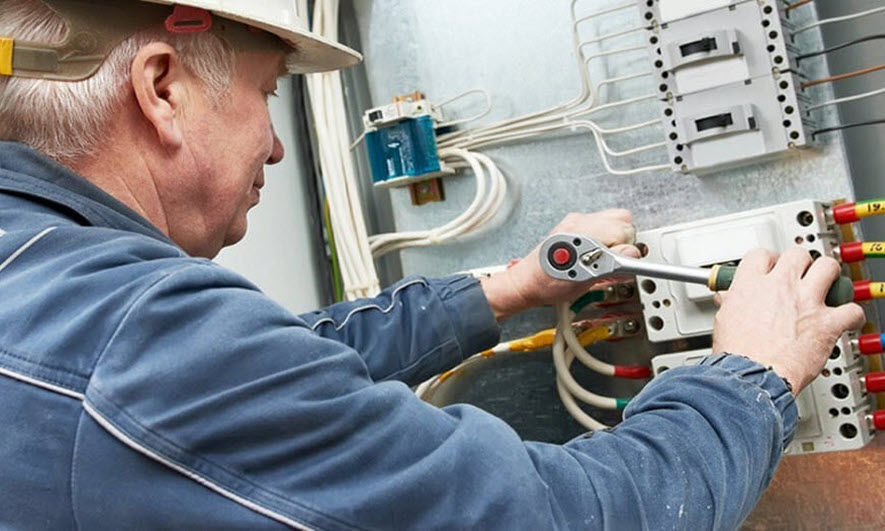
Electrician insurance provides coverage for liabilities and risks associated with electrical work. It protects electricians from potential financial losses due to property damage, personal injury, or legal claims.
Table of Contents
Electricians face various risks while working, and having the right insurance can provide them with peace of mind and protection. As a professional electrician, being adequately insured is essential to safeguard your business and reputation. Electrician insurance typically includes general liability, workers’ compensation, and professional liability coverage tailored to the specific needs of electricians and electrical contractors.
By investing in comprehensive insurance, electricians can continue to provide their valuable services without worrying about unexpected financial burdens resulting from unforeseen accidents or incidents.

Credit: insureyourcompany.com
Why Electricians Need Insurance
Electricians play a crucial role in ensuring the safety and functionality of electrical systems in residential, commercial, and industrial properties. However, the nature of their work exposes them to various risks. This is why having insurance is vital for electricians to protect their business, ensure client satisfaction, and mitigate potential financial burdens resulting from unexpected events.
Protect Your Business
Electricians face numerous risks while on the job, including electrical accidents, property damage, and injury claims. Without insurance coverage, these incidents could lead to significant financial liabilities, potentially jeopardizing the future of an electrician’s business. Electrician insurance provides protection against these risks, ensuring that your livelihood and assets remain safeguarded in case of unexpected events.
Ensure Client Satisfaction
When hiring an electrician, clients expect professionalism, reliability, and quality service. Having insurance not only protects your business but also reassures clients that you are a responsible and trustworthy professional. Insurance coverage demonstrates your commitment to client satisfaction by providing them with the assurance that any potential mishaps or damages during a project will be promptly addressed and resolved.

Credit: www.thehartford.com
Types Of Insurance For Electricians
Electricians face various risks and potential liabilities in their line of work. That’s why having the right insurance coverage is crucial to protect their business, clients, and employees. Here are the different types of insurance that electricians should consider:
General Liability Insurance
General liability insurance provides coverage for third-party bodily injury, property damage, and advertising injury. It protects electricians from legal and medical costs in case of accidents or property damage during work.
Professional Liability Insurance
Professional liability insurance, also known as errors and omissions insurance, offers protection in case a client claims financial loss due to a mistake or negligence in the electrician’s work. It covers legal defense costs and settlements.
Workers’ Compensation Insurance
Workers’ compensation insurance is essential for electricians with employees. It provides coverage for medical expenses and lost wages for employees who are injured on the job. It also protects employers from potential lawsuits related to workplace injuries.
Commercial Auto Insurance
Commercial auto insurance is crucial for electricians who use vehicles for business purposes. It covers damages to the vehicle and liability for injuries or property damage caused by the electrician while driving for work.
Tool And Equipment Coverage
Tool and equipment coverage protects electricians’ tools and equipment from theft, damage, or loss. It ensures that they can continue their work without disruption, even in the event of an unforeseen loss.
What To Consider When Choosing Insurance Coverage
When it comes to protecting your electrical business, having the right insurance coverage is crucial. The right insurance policy can provide financial security and peace of mind in case of unforeseen events or accidents. However, with so many options available in the market, it can be overwhelming to choose the right coverage for your specific needs. To make your decision easier, consider the following factors:
Coverage Limits
Understanding the coverage limits of your insurance policy is essential. Coverage limits refer to the maximum amount an insurance company will pay for a covered incident. It’s important to assess your business’s unique risks carefully and choose coverage limits that adequately protect your assets. Whether it’s property damage, liability claims, or stolen equipment, ensure your policy has sufficient limits to cover potential expenses.
Policy Exclusions
Policy exclusions are specific situations or events that are not covered by your insurance policy. Familiarizing yourself with the policy exclusions is crucial to prevent any surprises or unexpected expenses. Take the time to read the fine print and understand what is included and excluded from your coverage. For example, some policies might exclude coverage for faulty workmanship or intentional acts. Being aware of these exclusions helps you plan and mitigate risks accordingly.
Premium Costs
The premium cost of your insurance policy is an important aspect to consider. While it’s tempting to opt for the cheapest option available, it’s essential to strike a balance between affordability and comprehensive coverage. Evaluate the premium costs in relation to the coverage provided. Remember that a higher premium may offer broader coverage and additional benefits, potentially saving you from significant financial losses in the long run. Compare different insurance providers and policies to find the best value for your money.
Claims Process
The claims process is an often overlooked but crucial factor when choosing insurance coverage. In the event of an accident or loss, a smooth and efficient claims process can make all the difference in recovering quickly. Research the reputation and customer reviews of insurance providers for their claims handling process. Look for companies that have a hassle-free claims process, quick response times, and a reputation for fair settlements. This will ensure that you can get back to business promptly, without any unnecessary delays or frustrations.
How Insurance Benefits Electricians
Electricians benefit greatly from having insurance coverage, as it protects them from financial risks and liabilities, offering peace of mind. With insurance in place, electricians can confidently carry out their work, knowing that any potential accidents, damages, or lawsuits will be covered.
Electricians play a crucial role in ensuring the safety and functionality of electrical systems. However, their work also involves various risks and challenges. That’s where having the right insurance coverage can make a world of difference. Insurance provides financial protection, legal security, boosts client confidence, and promotes business growth. Let’s delve deeper into the benefits of insurance for electricians.
Financial Protection
Accidents and mishaps can occur even to the most skilled electricians. In such unfortunate instances, having insurance coverage provides a safety net for financial stability. Whether it’s an injury caused during work or damage to a client’s property, insurance helps cover the costs involved. By having adequate insurance, electricians can avoid significant financial setbacks that could otherwise impact their business operations.
Legal Protection
Electrical work involves various regulations and compliance requirements. A single legal claim or lawsuit can be detrimental to an electrician’s reputation and finances. Insurance serves as a safeguard by providing legal protection. It helps cover legal expenses and potential damages in case of litigation. Having comprehensive insurance ensures that electricians can focus on their work with peace of mind, knowing they are protected against unforeseen legal challenges.
Client Confidence
When clients hire an electrician, they expect a competent professional who can guarantee efficient and reliable services. Insurance plays a vital role in building client confidence. It demonstrates that electricians prioritize their clients’ interests and take their responsibilities seriously. With insurance coverage in place, electricians can assure their clients that any potential damages or accidents will be handled promptly and professionally. This boosts client trust and enhances the overall reputation of the electrician’s business.
Business Growth
Insurance not only protects electricians from financial and legal risks but also contributes to their business growth. Many clients require proof of insurance before hiring an electrician. By having insurance coverage, electricians can access a wider range of job opportunities and attract more clients. Insurance can be a differentiating factor that sets electricians apart from their competitors and gives them a competitive edge in the industry.
Additionally, insurance coverage also opens doors to larger projects and collaborations with businesses that only work with insured professionals. Overall, insurance is an essential investment for electricians, providing financial and legal protection, building client confidence, and driving business growth. By securing the right insurance coverage, electricians can safeguard their livelihoods, mitigate risks, and thrive in their profession.
Tips For Finding The Right Insurance Policy
Finding the right insurance policy for electricians can be a daunting task. It’s crucial to consider coverage specific to the electrical trade and ensure the policy includes protection for potential risks such as liability, equipment damage, and business interruption. Conducting thorough research and consulting with insurance experts can help in making an informed decision.
Evaluate Your Business Needs
Before you start searching for an electrician insurance policy, it’s crucial to assess your business needs. Take a moment to consider the specific risks and liabilities associated with your electrical business. Are you primarily involved in residential work or do you also handle commercial projects? Do you provide repair and installation services or specialize in certain areas such as HVAC systems or lighting? Identifying your business needs will help you focus on the specific coverage options that are essential for your industry.
Research Insurance Providers
Once you have a clear understanding of your business needs, it’s time to research insurance providers. Look for reputable insurance companies that specialize in electrician insurance coverage. Consider their industry experience, financial stability, and customer reviews. A reliable insurance provider should have a good track record of handling claims efficiently and providing excellent customer service. Additionally, check if the provider offers customizable coverage options to tailor the policy to your specific requirements.
Get Quotes And Compare
After narrowing down potential insurance providers, it’s important to obtain quotes and compare them. Request quotes based on the coverage options you need, ensuring that you provide accurate information about your electrical business. It’s best to compare quotes from multiple insurance providers to find the most competitive rates without compromising on the quality of coverage. Keep in mind that the cheapest option might not always be the best choice, so consider the overall value provided by each insurance policy.
Read And Understand The Policy Terms
Before making a final decision, it’s crucial to thoroughly read and understand the terms of the insurance policy. Pay close attention to the coverage limits, exclusions, deductibles, and any additional conditions or requirements. Ensure that the policy covers all the essential risks and liabilities specific to your electrical business.
If you come across any unfamiliar terms or have questions, don’t hesitate to reach out to the insurance provider for clarification. Remember, gaining a comprehensive understanding of the policy terms will help you make an informed decision and avoid any surprises in the future.
Frequently Asked Questions On Electrician Insurance
What Is Electrician Insurance?
Electrician insurance is a type of insurance coverage specifically designed for electricians. It protects them from potential liability claims and financial losses that may arise from accidents or damages that occur during their work.
Why Do Electricians Need Insurance?
Electricians need insurance because their work involves potential risks and liabilities. Insurance provides financial protection in case of accidents, property damage, or injuries while working on electrical projects. It helps cover legal fees, medical expenses, and compensation claims.
What Does Electrician Insurance Cover?
Electrician insurance typically covers liability claims, property damage, bodily injuries, completed operations, and product liability. It may also provide coverage for tools and equipment, business interruption, and personal injury. The specific coverage can vary depending on the policy and insurer.
How Much Does Electrician Insurance Cost?
The cost of electrician insurance can vary depending on factors such as the type of coverage, the size of the business, the level of risk involved, and the location. On average, electrician insurance can cost anywhere from $500 to $1,500 per year.
Conclusion
Obtaining electrician insurance is a crucial step for protecting your business from unexpected risks and liabilities. With the right coverage in place, you can have peace of mind knowing that you have financial protection in case of accidents, property damage, or lawsuits.
Don’t underestimate the importance of insurance for your electrical business. Take the necessary steps to secure appropriate coverage and safeguard your future success.





